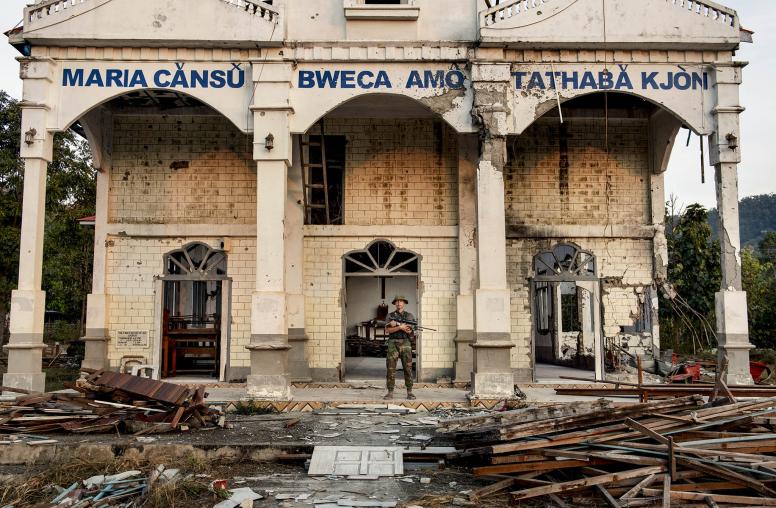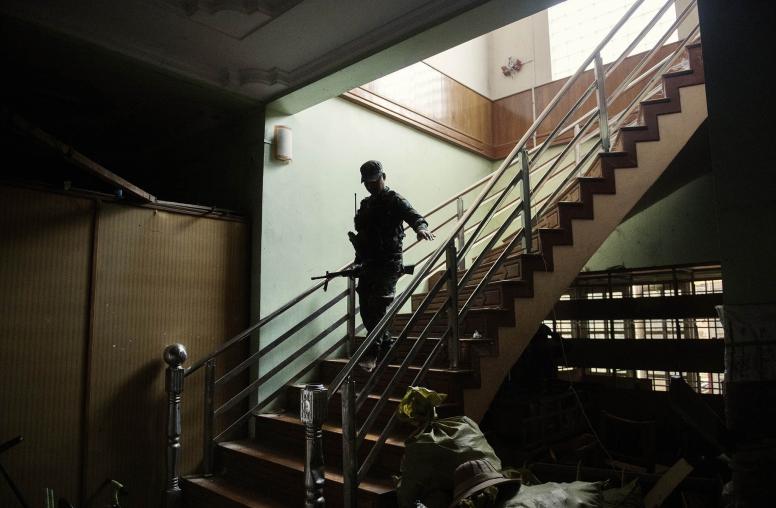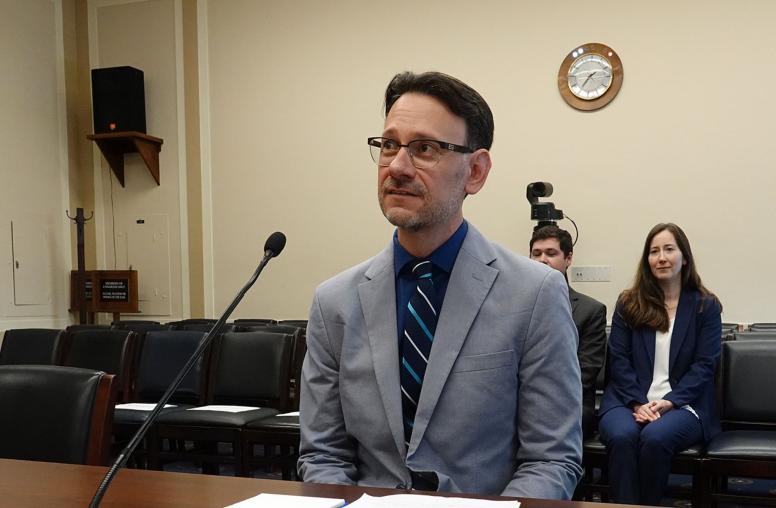Research & Analysis
U.S. Institute of Peace’s articles, reports, tools and other features provide policy analysis, research findings, and practitioner guides. These publications examine critical conflict issues at the center of the Institute’s work to prevent and resolve violent conflict.
The views expressed in these publications are those of the author(s).

Jason Tower on How China-Backed Scam Groups Threaten U.S. Interests
Transnational scams based out of Southeast Asia are increasingly targeting American citizens in a trend that is being “increasingly compared to fentanyl in terms of the impacts on the U.S.,” says USIP’s Jason Tower, adding that since the crime syndicates have close ties with China, we should be “pushing China on this issue to hold it accountable.”

China Exploits Thailand’s Crackdown on Scam Compounds to Grow Security Influence
Under pressure from China, Thailand has begun its most significant crackdown to date on the transnational crime groups that dominate the Myanmar-Thailand border region. USIP’s Jason Tower explains what prompted the crackdown, how it will impact global efforts to curb transnational crime, what it says about China’s growing influence in the region, and how this all affects U.S. security interests.

Myanmar’s Resistance Manages to Defy Chinese Pressure — For Now
In early August, resistance forces in northern Myanmar delivered yet another historic defeat to the Myanmar military. After just 35 days of fighting, resistance actors toppled the Myanmar army’s northeastern command, bringing expansive amounts of territories across northern Shan State under their control. These developments rippled through Myanmar and reinvigorated the resistance — but also triggered a dramatic response from the Chinese government.

The Latest on Southeast Asia’s Transnational Cybercrime Crisis
Increasing scrutiny and exposure of global internet scams based in Southeast Asia has sparked fast-moving developments to quash the schemes and countermoves by the organized gangs behind them. Recent months have seen crackdowns, arrests and internet cutoffs by law enforcement agencies and regional governments. Meanwhile, Cambodia and Myanmar continue to be the most egregious havens for criminal operations, while Laos seems to be demonstrating early signs of concern for the impact of organized crime on its sovereignty.

Southeast Asian Nations Convene amid Myanmar Crisis, South China Sea Tensions
Leaders from the Association of Southeast Asian Nations (ASEAN) are in Vientiane, Laos this week for the bloc’s annual summit and the concurrent East Asia Summit, which brings ASEAN together with other important regional players like the U.S., Japan, South Korea, Russia and China. Typically, the East Asia Summit is not a venue for major policy discussions, but the gathering offers opportunities for a bevy of side meetings between various countries. At both summits, Southeast Asian leaders will lament progress on Myanmar and the South China Sea — where China’s maritime claims and aggressive actions lead to tensions with regional countries — and the state of the world in general.

Myanmar Scam Hubs Revive Fast After China Eases Pressure on Junta
Transnational crime groups in Southeast Asia, hit with intense scrutiny and law enforcement action earlier this year, are moving into new areas and adapting their operations as they revive and expand global scam operations. In Myanmar — a key center of this internet-based criminal activity — extreme political instability combined with the connivance of the country’s military and its militias continue to provide fertile ground for crime groups, albeit in new configurations. At the same time, a sudden shift in China’s posture toward Myanmar’s military regime has eased pressure on the scam industry, allowing criminal networks to further scale up their malign activities.

As Myanmar’s Junta Loses Control in the North, China’s Influence Grows
Earlier this year, China brokered talks between Myanmar’s military and an alliance of ethnic armed organizations (EAOs) that handed the army its worst defeat in history. The negotiations’ goal was to restore overland trade — interrupted by fighting — between China’s Yunnan Province and Myanmar. To China’s frustration, the talks collapsed in mid-May, and in late June the alliance reopened its anti-junta offensive.

Examining the 2024 Annual Trafficking in Persons Report: Progress over Politics
Jason Tower, country director for the Burma program at the U.S. Institute of Peace, testified on July 9, 2024, before the U.S. House Foreign Affairs Committee Subcommittee on Global Health, Global Human Rights and International Organizations’ hearing on “Examining the 2024 Annual Trafficking in Persons Report: Progress over Politics.”

Jason Tower on the Dangerous Proliferation of Scam Compounds in Southeast Asia
Chinese crime syndicates have set up sophisticated online scamming operations throughout Southeast Asia that rake in an estimated $64 billion a year. Relying on forced labor, the scam compounds “look almost like penal colonies,” says USIP’s Jason Tower, adding: “This is happening on an industrial scale.”

China Forces Myanmar Scam Syndicates to Move to Thai Border
While Myanmar has long been the chief venue for the criminal operations of Chinese-origin gangs in Southeast Asia, these organizations have always stood ready to move — internally or across borders — if their sources of protection dissolved. In recent months, the organized crime kingpins have once again faced a fraying safety net. This time, the cause is the weakening of Myanmar’s corrupt coup regime in the face of a rising, multi-front revolution and, perhaps more importantly, an aggressive push by China’s law enforcement authorities.